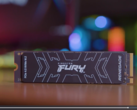After just stress testing the 2 TB Lexar NM800 Pro, we're now ready to put the 2 TB Kingston Fury Renegade under the same microscope to see how it handles maximum transfer rates. The drive is currently shipping on Amazon with an optional heat sink all designed to fit inside of the PS5. The manufacturer has sent us a sample with the heat sink already installed for benchmarking purposes.
For our host PC, we used the same Intel NUC11 mini PC which supports PCIe4 x4 NVMe SSDs. The chassis includes its own SSD heat sink, but we are only using the heat sink included with the Kingston drive.
The Fury Renegade packaging is as barebones as it can be. Whereas other drives may include a screw or manual, the Kingston packaging includes neither. The manufacturer advertises maximum read and write speeds of 7300 MB/s and 7000 MB/s, respectively, whereas PCIe3 x4 NVMe SSDs typically hover around the 3000 MB/s range.
When running the DiskSpd read test in a loop, we're able to reach a maximum sequential read rate of 7000 MB/s as shown by the graph below. After about 6 minutes in, however, performance would fall off a cliff to just 3000 MB/s. In contrast, the Lexar NM800 Pro would run at a stable 7000 MB/s from start to finish.
The temperature of the Kingston drive would peak at around 74 C during the stress test which may have triggered the throttling in order to prevent temperatures from reaching any higher. Only when we allowed the drive to rest for about 30 seconds before resuming the stress test would read rates reach 7000 MB/s again before the throttling cycle repeats. Thus, the heat sink is merely delaying performance throttling rather than preventing it altogether.
For most users, the throttling of the Kingston drive won't matter as it's uncommon for workloads to demand 7000 MB/s read rates for more than several minutes. PS5 games, for example, load in just a few seconds with longer periods of lower utilization in between. Extreme PC users may want to install their own more powerful heat sinks to better exploit the fast sequential transfer rates of the Fury Renegade.
* ... smaller is better



























